Only articles in with the "participatory budgeting" tag are displayed
To display all articles click
here.
 |
14. November 2011 – 23:06 by Asociacion Ciudades Kyosei / Pedro Prieto-Martin
|
The Asociación Ciudades Kyosei is a small civic organization whose aim is to foster Civic Engagement by means of ICT. It was founded in 2006 and is the oldest Spanish NGO devoted to the promotion of (e)Participation. In the last years we were researching on the field of Civic Engagement and ICT, with a special focus on Latin-America and Europe. Our work combines a critical attitude with an applied, hands-on focus, and has (1) theorized about Civic Engagement, (2) analysed the best design practices for (e)Participation systems, as well as (3) analysed the difficulties that exist to promote innovation in the ICT for Governance field. Our research has been widely recognized as refreshing and insightful.
In this PeP-NET post we would like to share a tool we have developed, “The matrix of civic implication”, whose main aim is to support the development of conceptual clarity when analyzing participatory venues and participatory initiatives. If used wisely, we think the matrix is a powerful “tool”, that goes beyond alternative models (like OECD, IAP2 or Fung’s), and should allow researchers, practitioners and the ‘man in the street’ to better understand the core dimensions of participatory activities.
The Matrix of Civic Implication
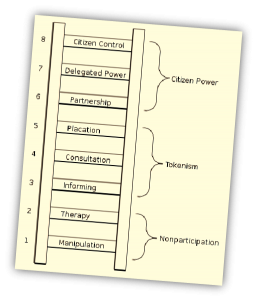 Since Sherry Arnstein presented her “Ladder of Citizen Participation” in 1969, tens of models have been proposed with the aim to describe “participation”.
Since Sherry Arnstein presented her “Ladder of Citizen Participation” in 1969, tens of models have been proposed with the aim to describe “participation”.
The problem with these models is that they tend to be either too basic -and thus they add less value- or they are too complex and specialized, and in this case they are too cumbersome to be applied.
For this reason… a lot of confusion exist in this field.
Our matrix tries to find a pragmatic balance between usefulness and complexity, and provide a tool that is at the same time powerful, practical and easy to use. It allows practitioners and theorists to compare in a matter of minutes different Participatory experiences. The model was developed to be applied to “municipal participation” initiatives, but it can be applied to other kind of participatory experiences.
The Matrix identifies four fundamental dimensions of participatory initiatives, which be informally “visualized”, and thus make this model especially suitable for comparing initiatives:
Read the rest of this entry »
Posted in open data, Tools, Visions | 1 Comment »
 |
28. February 2010 – 22:29 by Asociacion Ciudades Kyosei / Pedro Prieto-Martin
|
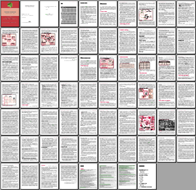 For those of you that read Spanish, the report that the Asociación Ciudades Kyosei just released (which can be downloaded from its website) could interest you much, as understanding “Citizen Participation” continues to be the basis to developing any “e-Participation” initiative.
For those of you that read Spanish, the report that the Asociación Ciudades Kyosei just released (which can be downloaded from its website) could interest you much, as understanding “Citizen Participation” continues to be the basis to developing any “e-Participation” initiative.
The text “(e)Participación en el ámbito local. Caminando hacia una democracia colaborativa” deals with citizen participation as it was known during the XX Century.
It analyses its strengths, potential and problems from a critical, irreverent, but nevertheless thoughtful perspective. To illustrate the characteristics of citizen participation, the report provides a comprehensive and original analysis of Participatory Budgeting Experiences of the big brazilian cities (with special emphasis on Porto Alegre and Fortaleza).
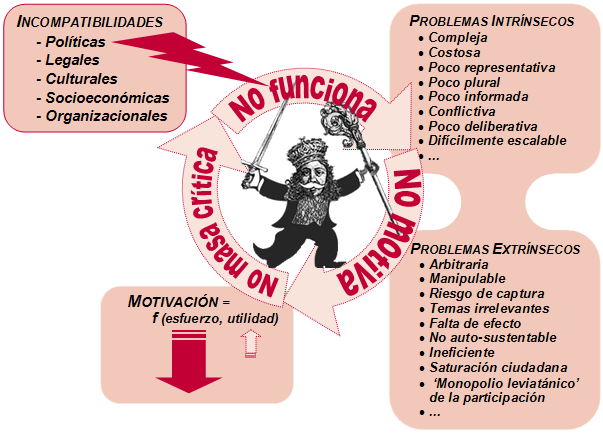
Vicious cycle of participation
Based on this understanding of traditional Citizen Participation, the upcoming chapters of the report will be able to reflect on the “Participation of the twenty-first century”: our beloved “e-Participation”.
This text was prizewinner in the last CLAD Congress (the most important Latin-American congress on State Reform and Public Administration Modernization), which took place in Salvador de Bahia (Brazil).
We really expect you will find this report refreshing, and actually hope it will foster interesting reflections from your side.
Posted in Visions | 3 Comments »
 |
20. October 2009 – 15:48 by Rolf Luehrs
|
Like in other European countries participatory budgeting is one of the most prominent examples of citizen participation in politics in Germany. More than 115 municipalities or cities are currently about to implement or have already implemented participatory budgeting projects.
However, there are lots of different concepts of what participatory budgeting exactly means and even more ways to put these concepts into practice. The main differences are the following:
Approach
While participatory budgeting was originally designed as an instrument of direct democracy with a binding decision of the citizenry, most of the European PBs are implemented as consultations: The citizens were given opportunity to have their say but it is up to the elected representatives to finally decide about the proposals.
Scope
In many cases only selected parts of the public budget are under consideration in others the entire budget is subject to citizen participation. Interestingly the scope seems to depend on the chosen approach: When the entire budget is under consideration, the opinions and preferences of the citizens usually are not binding.
Instruments & Channels
Some of the participatory budgeting projects are still implemented using only traditional communication channels. In most cases the Internet is leastwise used to spread information. Quiet a lot of municipalities or cities are providing interactive channels on the Internet to support the offline activities. And in a few cases the Internet is the only channel for the citizens to participate.
In the following I will focus on the cases where citizens have been provided with an interactive website allowing them to express their views and priorities online.
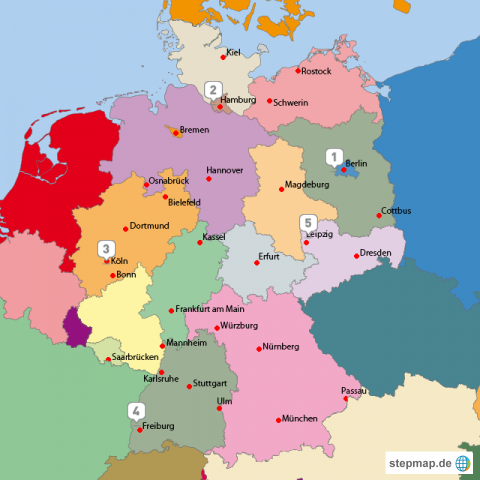
Click on the map for further information
Read the rest of this entry »
Posted in good practice, Projects, Tools, Trends, TuTech | 9 Comments »
 |
17. June 2009 – 15:07 by Bengt Feil (TuTech Innovation GmbH)
|
On Tuesday (16.06.2009) the second participatory budgeting project has been launched in the city of Hamburg (1.8 million inhabitants).
It can be found here: www.buergerhaushalt-hamburg.de
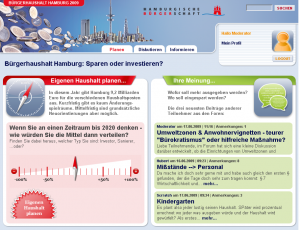
The overall theme of the participation effort is to get citizens involved in the long term planning of the cities budget: How should money be spend in future years? Which city services are important and how can they be organized in a more efficient way?
The platform incorporates a budget planer, discussion forums and other means of participation to cover both the general and specific questions related to the cities budget. Furthermore politicians and budget experts are also involved in process and the discussion.
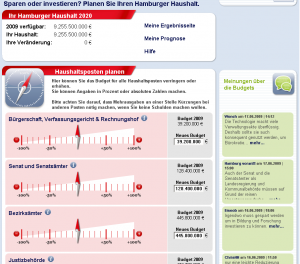
From June 16th till July 10th the citizens of Hamburg will be able to give their ideas and opinions about the future development of the budget.
Posted in Projects | 1 Comment »
 |
23. October 2008 – 09:39 by Bengt Feil (TuTech Innovation GmbH)
|
This years conference season is filled with very interesting events and the Forum in the Future of Democracy held by the Council of Europe in Madrid on October 15th to 17th was surely on of them. This regular event is aimed at covering a wide range of different topics connected to the future of democracy and this year’s tagline was: eDemocracy – Who dares? With this provocative theme at hand and with the long list of very interesting invited speakers and participants this year’s forum was set up to be a success. I would like to share a few of my personal impressions and highlights of the event besides the wonderful weather in Madrid.
The keynote of one of the founders of Skype who is now working both in the academic and the social sector on the first day of the conference made is clear that the topic of eDemocracy has matured and is seen as being very important beyond the core group of enthusiasts. The large number of attendees representing public administrations and EU and national organizations also supports this point and shows that many of the decision-makers in the different branches of government have picked up the topic and are moving forward.
Read the rest of this entry »
Posted in TuTech | 2 Comments »
 |
8. October 2008 – 17:38 by Rolf Luehrs
|
Round table discussion about Participatory Budgeting and ICT at the 9th World e-Democracy Forum in Paris, October 16, 9.00 – 10:30
Participatory budgeting is a method to involve ordinary citizens in the decision-making process of allocating municipal or public budgets. Proponents of this method suggest that this involvement leads to more sustainable and equitable public spending, increased governmental transparency and accountability and creates stronger links between citizens and (local) government.
While participatory budgeting is already quite established in different municipalities in South America and especially in Brazil, more and more European governments are currently experimenting with this participatory instrument. In some cases, like e.g. the cities of Hamburg and Freiburg (Germany) or the city of Belo Horizonte (Brazil), participatory budgeting has been supported by ICT and web based systems.
The round table discussion will focus on questions whether the Internet is likely to increase the quality and the acceptance of participatory budgeting and what are the specific strengths and weaknesses of eParticipation solutions in this domain.
Input statements from:
Rüdi ger Kruse
ger Kruse
Member of the Hamburg state and municipal Parliament. Speaker for finance and sustainability of the Christian Democrats. Rüdiger Kruse was one the driving forces of the e-Participatory Budgeting project in the City of Hamburg, 2006.
Ruth J ackson
ackson
Research and Information Officer for the Participatory Budgeting Unit (PBU), a project of the charity Church Action on Poverty. The Unit’s remit is to support and encourage the uptake and development of participatory budgeting (PB) in the UK.
Tiag o Peixoto
o Peixoto
PhD researcher at the European University Institute (EUI – Italy), and associate researcher at the Electronic Democracy Centre (Switzerland), a joint venture of Zurich University, the EUI and the Oxford Internet Institute (UK). Tiago Peixoto has recently conducted research into the use of ICTs in Participatory Budgeting and, particularly into one of the most significant e-Participatory Budgeting projects which has been realised in Belo Horizonte, Brazil, in 2006.
Posted in good practice, News, Trends, TuTech | 1 Comment »
 |
24. September 2008 – 09:29 by Bengt Feil (TuTech Innovation GmbH)
|
On September 15th the Participatory Budgeting Unit, a project by the Church Action against Poverty, organized the first National PB conference in Manchester (UK). For a short introduction to the topic the PB Unit does explain Participatory Budgeting and the reasons why it should be done very well on their website. I was at the event as one of the few non UK citizens and therefore had kind of an outsiders look on what is going on over there. I would like to talk about a few of these impressions.
The first significant fact was that an estimate of 250 representatives of mainly public bodies and councils took part in an event which was focus on what is still a niche topic. This shows that the interest in Participatory Budgeting in the UK is strong and that we can assume that there will be a number of new towns and quarters who start using PB in the next years. I had the opportunity to speak to some of the representatives of cities who already use PB and they were very clear in stating that they will keep up their efforts and that PB has to be a long term process which can not be done “right” at the first try.
Read the rest of this entry »
Posted in Trends, TuTech | 2 Comments »
 |
12. June 2008 – 14:24 by Bengt Feil (TuTech Innovation GmbH)
|
In 2004 James Surowiecki in his famous book “The Wisdom of Crowds: Why the Many Are Smarter Than the Few and How Collective Wisdom Shapes Business, Economies, Societies and Nations” discussed at length how collective decisions are made and that they can be much more rational and “correct” than those of a single or few experts. He uses examples form the fields of economy, politics and everyday life to support this point. I will try to describe another case where the wisdom of crowds seems to be working – participatory budgeting.
It is often stated that citizens only try to gain individual advantages and therefore are unwilling to provide ideas about how to consolidate public spending. There is also the argument that the high complexity of public budgeting makes it almost impossible for citizens to take rational and useful decisions about how to change it. But if you look at the results of participatory budgeting projects this does not seem to be the case. Read the rest of this entry »
Posted in good practice, Projects | No Comments »
 Since Sherry Arnstein presented her “Ladder of Citizen Participation” in 1969, tens of models have been proposed with the aim to describe “participation”.
Since Sherry Arnstein presented her “Ladder of Citizen Participation” in 1969, tens of models have been proposed with the aim to describe “participation”.
 For those of you that read Spanish, the report that the
For those of you that read Spanish, the report that the 











